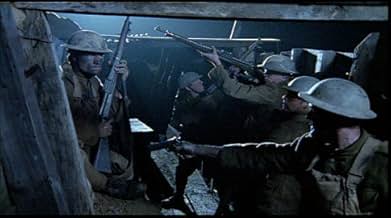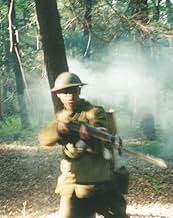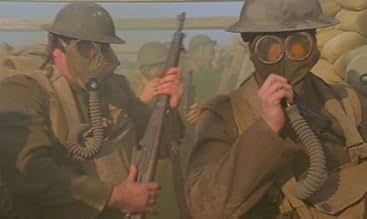World War I troubled veteran Joe Delaney attempts to compile a history of his U.S. Marines company but nightmares about the German soldier he killed haunt him still.World War I troubled veteran Joe Delaney attempts to compile a history of his U.S. Marines company but nightmares about the German soldier he killed haunt him still.World War I troubled veteran Joe Delaney attempts to compile a history of his U.S. Marines company but nightmares about the German soldier he killed haunt him still.
- Director
- Writers
- All cast & crew
- Production, box office & more at IMDbPro
Storyline
Featured review
Before he found his writer's voice, writer William March spent the better part of fifteen years thinking about the horrors he experienced as an infantryman in World War One. The book was titled "Company K," and has become a war classic alongside "Johnny Got His Gun" and "All Quiet on the Western Front."
Seventy years following the book's publication, filmmaker Robert Clem has converted March's story into an accessible and engaging documentary.
"Company K" is Clem's latest, and in my opinion, best work. The film provides a stark and compelling look at the First World War in which 100,000 American men died, although the memory of that war has virtually vanished. (I know Robert Clem and his work from the documentary he made partly of the life of my grandfather, in another WWI film "War Birds: Diary of an Unknown Aviator.")
Using a score of vignettes that roughly follow March's written format, the film portrays war's farce and horror. Here is a young soldier joining his cohorts in a French bar. One of the hostesses seduces the man by telling how her husband recently died on the Front. It might have turned into a love story, except for the fact that as soon as they return to the bar, she moves on to the next soldier. Our naive protagonist is initially dumbstruck, and then becomes enraged, attacking his company mates.
A nice allegory of how war operates on the push-pull emotions of lust and betrayal.
Another off-battle scene could easily have occurred in peacetime. The company's commanding office bullies his men relentlessly, tearing up their shore passes one by one as he throws their washed clothes into the mud. "Wash them again," he commands. The men are crestfallen. These opening scenes quickly move to grittier stuff. If it's gore you're looking for, you won't be disappointed. The violence is low key--and devastating. One scene shows two soldiers coming across a dead German. The men are hungry, and discover a loaf of bread on the dead man. The scene might not work in color, as the realism could prove a distraction. When the men discover the bread to be soaked in the soldier's blood, they hesitate. One after the other they dig in, swallowing every bite.
Another scene develops more slowly. Americans are ordered to shoot German prisoners. At first the men resist, but then comes the clincher.
"These prisoners are not really surrendering," the sergeant tells them. "It's an old trick. The sergeant's words prove effective. His men's astonished sense of betrayal pushes them into slaughtering their counterparts. The scene proves to be a harrowing preview of the Nazi techniques used twenty years later.
Company K is particularly instructive in today's political turmoil. You won't hear any arguments among academics or war hawks that the Great War lived up to its name, or succeeded in making the world Safe for Democracy. In Robert Clem's "Company K," we experience what poet Robert Lowell called war's "blundering butcher" as it tromped across Europe and left scars that remain with us today.
Seventy years following the book's publication, filmmaker Robert Clem has converted March's story into an accessible and engaging documentary.
"Company K" is Clem's latest, and in my opinion, best work. The film provides a stark and compelling look at the First World War in which 100,000 American men died, although the memory of that war has virtually vanished. (I know Robert Clem and his work from the documentary he made partly of the life of my grandfather, in another WWI film "War Birds: Diary of an Unknown Aviator.")
Using a score of vignettes that roughly follow March's written format, the film portrays war's farce and horror. Here is a young soldier joining his cohorts in a French bar. One of the hostesses seduces the man by telling how her husband recently died on the Front. It might have turned into a love story, except for the fact that as soon as they return to the bar, she moves on to the next soldier. Our naive protagonist is initially dumbstruck, and then becomes enraged, attacking his company mates.
A nice allegory of how war operates on the push-pull emotions of lust and betrayal.
Another off-battle scene could easily have occurred in peacetime. The company's commanding office bullies his men relentlessly, tearing up their shore passes one by one as he throws their washed clothes into the mud. "Wash them again," he commands. The men are crestfallen. These opening scenes quickly move to grittier stuff. If it's gore you're looking for, you won't be disappointed. The violence is low key--and devastating. One scene shows two soldiers coming across a dead German. The men are hungry, and discover a loaf of bread on the dead man. The scene might not work in color, as the realism could prove a distraction. When the men discover the bread to be soaked in the soldier's blood, they hesitate. One after the other they dig in, swallowing every bite.
Another scene develops more slowly. Americans are ordered to shoot German prisoners. At first the men resist, but then comes the clincher.
"These prisoners are not really surrendering," the sergeant tells them. "It's an old trick. The sergeant's words prove effective. His men's astonished sense of betrayal pushes them into slaughtering their counterparts. The scene proves to be a harrowing preview of the Nazi techniques used twenty years later.
Company K is particularly instructive in today's political turmoil. You won't hear any arguments among academics or war hawks that the Great War lived up to its name, or succeeded in making the world Safe for Democracy. In Robert Clem's "Company K," we experience what poet Robert Lowell called war's "blundering butcher" as it tromped across Europe and left scars that remain with us today.
Details
Contribute to this page
Suggest an edit or add missing content































